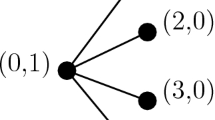Abstract
In this paper, we give a complete and explicit description of the splitting behavior of any place in a quintic trinomial dihedral or cyclic extension of a rational function field of finite characteristic distinct from 2 and 5. Our characterization depends only on the order of the base field and a parametrization of the coefficients of the generating trinomial. Moreover, we contrast some of our results to trinomial dihedral number fields of prime degree, where the unit rank behaves quite differently from the function field scenario.
Similar content being viewed by others
References
Azuhata T., Ichimura H.: On the divisibility problem of the class numbers of algebraic number fields. J. Fac. Sci. Univ. Tokyo 30, 579–585 (1984)
Dummit D.S.: Solving solvable quintics. Math. Comput. 57(195), 387–401 (1991)
Frohlich A., Talyor M.J.: Algebraic Number Theory. Cambridge University Press, Cambridge (1993)
Jacobson, M., Lee, Y., Scheidler, R., Williams, H.: Cubic Function Fields from Quadratic Infrastructure (preprint)
Lee Y.: The unit rank classification of a cubic function field by its discriminant. Manuscripta Math. 116, 173–181 (2005)
Lee Y.: The structure of the class groups of global function fields with any unit rank. J. Ramanujan Math. Soc. 20(2), 1–21 (2005)
Lee Y., Pacelli A.: Class groups of imaginary function fields: the inert case. Proc. Am. Math. Soc 133, 2883–2889 (2005)
Lee Y., Pacelli A.: Higher rank subgroups in the class groups of imaginary function fields. J. Pure Appl. Algebra 207, 51–62 (2006)
Nakano S.: On ideal class groups of algebraic number fields. J. Reine Angew. Math. 358, 61–75 (1985)
Pacelli A.: Abelian subgroups of any order in class groups of global function fields. J. Number Theory 106, 26–49 (2004)
Pacelli A.: The prime at infinity and the rank of the class group of a global function field. J. Number Theory 116, 311–323 (2006)
Roland G., Yui N., Zagier D.: A parametric family of quintic polynomials with Galois group D 5. J. Number Theory 15, 138–142 (1982)
Rosen M.: Number Theory in Function Fields, GTM. Springer, New York (2002)
Scheidler, R.: Algorithmic aspects of cubic function fields. In: Algorithmic Number Theory. Lecture Notes in Computer Science, vol. 3076, pp. 395–410. Springer, Berlin (2004)
Scheidler R., Stein A.: Approximating Euler products and class number computation in algebraic function fields. Rocky Mt J. Math. 40(5), 1689–1727 (2010)
Weber H.: Lehrbuch der Algebra. Chelsea, New York (1961)
Author information
Authors and Affiliations
Corresponding author
Rights and permissions
About this article
Cite this article
Im, BH., Lee, Y. Decomposition of places in dihedral and cyclic quintic trinomial extensions of global fields. manuscripta math. 137, 107–127 (2012). https://doi.org/10.1007/s00229-011-0459-4
Received:
Revised:
Published:
Issue Date:
DOI: https://doi.org/10.1007/s00229-011-0459-4



